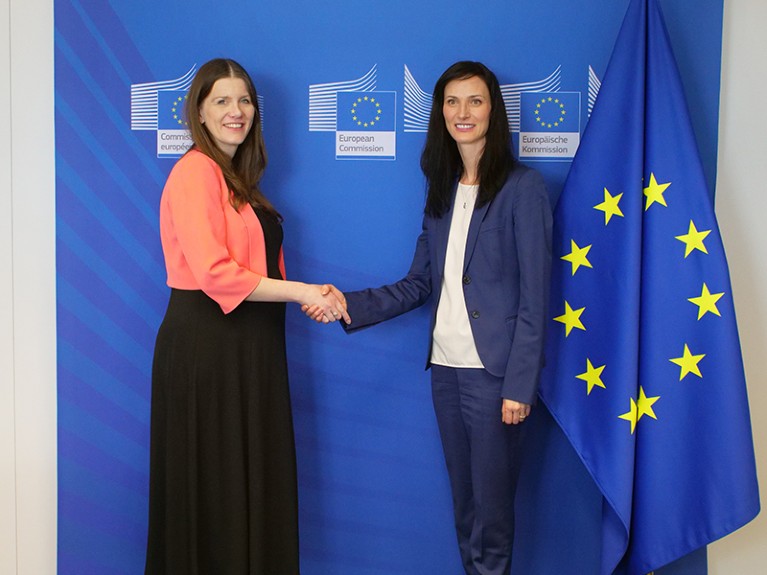
Michelle Donelan, UK cabinet minister for science, and EU science chief Mariya Gabriel met in Brussels to restart stalled talks on UK access to the Horizon programme.Credit: UK Mission to the EU
On 4 April, UK science minister Michelle Donelan and the European Union’s top science official, Mariya Gabriel, met in Brussels. To the delight of the research community, they restarted stalled talks on how UK researchers can continue to access European grants — specifically a €95.5-billion (US$105-billion) scheme called Horizon Europe. The fund runs from 2021 to the end of 2027, but it has been closed to the post-Brexit United Kingdom for the past two years.
The sense of euphoria was dampened two days later, when the UK government published an alternative funding plan called Pioneer. This is its ‘plan B’, should UK–EU talks break down. The verdict of the leading UK research institutions is near-unanimous: anything less than full membership of Horizon Europe will be an inferior outcome. Nevertheless, all concerned researchers need to study the document, called Pioneer: Global Science for Global Good. Although the official government line is that rejoining Horizon Europe remains the preferred option, the text of the alternative proposal gives a very different impression.
To be fair, there is merit in many aspects of Pioneer. It promises an array of new awards for scientists at different career stages, from PhD students to more established researchers. Extra funding is on offer for innovation research and also for infrastructure, which is too often neglected. Importantly, there’s an open invitation for researchers from other countries to come and work in the United Kingdom. And it promises that researchers can continue to access Horizon Europe — albeit as members of a ‘third country’, joining a number of other non-EU countries that can participate in, but not lead, projects.
UK, please drop the rhetoric and fight for collaboration with Europe
But a closer look at the details reveals more to be concerned about. The government intends to allocate an extra £14.6 billion (US$18.2 billion) to the Pioneer programme between now and the end of 2027 or 2028. This is equivalent to what the United Kingdom would have spent had it joined Horizon Europe at the start of the latest funding cycle in 2021. But unlike Horizon funding, the Pioneer sums are not guaranteed — they will go through regular government ‘spending reviews’ that pit government departments against each other for funding. During spending reviews, it is not uncommon for some departments to come away with less than they had hoped for.
Another problematic aspect is Pioneer’s alignment with the UK government’s objective “to strengthen the UK’s position as a science and technology superpower” (the word ‘superpower’ is mentioned 13 times in the document). This is a laudable aim — but it falls short when measured against the ultimate purpose of Horizon Europe, which is the reason countries have joined it.
Horizon Europe is designed to strengthen cooperative bonds between countries, advance knowledge and innovation, and harness the power of a collective approach to solve global challenges. Horizon Europe’s priorities include boosting competitiveness and growth, creating jobs, tackling climate change and helping to achieve the United Nations Sustainable Development Goals. The Pioneer proposal mentions some, but not all, of the above.
There’s no mention of the Sustainable Development Goals, nor the United Nations. Thankfully, it does underscore the necessity of multilateralism, but at the same time it talks of boosting what it calls “minilaterals”, in which smaller groups of like-minded countries cooperate, for example to counter external threats, which is in line with UK foreign and defence policy.
Keep science out of Europe’s post-Brexit arguments
These are all legitimate positions for a government to take; indeed, researchers play an essential part in providing evidence that underpins national policymaking. But the Horizon programme that UK researchers want access to has a different, complementary role to a research fund prioritizing national needs.
There is already strong evidence that the United Kingdom is decoupling from European and global institutions and standards. UK students, for example, could have had continued access to the Erasmus student-exchange scheme even after Brexit, but the government chose to end UK membership. Last year, it ended the Global Challenges Research Fund, a five-year, £225-million funding scheme in which UK researchers collaborated with scientists in low- and middle-income countries on projects related to the Sustainable Development Goals.
In a similar vein, the Pioneer proposal reads, in places, like an advertisement about what the United Kingdom thinks is wrong with EU research funding. The plan says that the durations of Pioneer grants will be longer than those of EU grants, researchers will have more autonomy and there will be less bureaucracy. Again, there is nothing wrong with these aspirations — but such language doesn’t strike the kind of tone expected from a government fully committed to rejoining Horizon Europe.
Access to Horizon Europe is a rare opportunity for the United Kingdom to remain in an influential, globally connected research programme with the Sustainable Development Goals at its heart. Forging new relationships, which Pioneer seeks to do, is valuable and important. But it should not happen at the expense of existing links, some of which have taken decades to establish. Those connections between people and institutions are not just priceless, but essential to progress in research. That is why it is imperative that the research community continues to speak with one voice, to say no to Plan B and yes to association with Horizon Europe.

 UK, please drop the rhetoric and fight for collaboration with Europe
UK, please drop the rhetoric and fight for collaboration with Europe
 Keep science out of Europe’s post-Brexit arguments
Keep science out of Europe’s post-Brexit arguments
 The EU must learn from the anti-expert narrative that drove Brexit
The EU must learn from the anti-expert narrative that drove Brexit
 UK and EU: Cherish what you have achieved and stay close
UK and EU: Cherish what you have achieved and stay close






